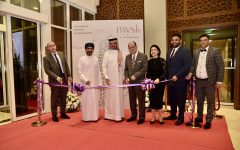 Flydubai has announced its Full-Year Results for 2016 reporting a profit of AED 31.6 million ($8.6 million). It has reported total revenue of AED 5 billion ($1.37 billion) an increase of 2.4 per cent compared to the same period last year. The stronger second half, driven by increased passenger numbers, was impacted by downward pressure on yield leading to lower overall revenue growth reflecting a continuation of the same adverse factors reported in the first half.
Flydubai has announced its Full-Year Results for 2016 reporting a profit of AED 31.6 million ($8.6 million). It has reported total revenue of AED 5 billion ($1.37 billion) an increase of 2.4 per cent compared to the same period last year. The stronger second half, driven by increased passenger numbers, was impacted by downward pressure on yield leading to lower overall revenue growth reflecting a continuation of the same adverse factors reported in the first half.
His Highness Sheikh Ahmed bin Saeed Al Maktoum, Chairman, flydubai, said: “These results see flydubai report its fifth consecutive full-year of profitability. In 2012, our third year of operation, we carried 5.1 million passengers. This year, we have carried 10.4 million passengers demonstrating that flydubai continues to help change the way both business and leisure passengers travel around the region. An established tourism destination and global centre for business together with the UAE’s geographic location has supported the need for increased connectivity.”
Ghaith Al Ghaith, CEO, flydubai, reviewing the Annual Results for 2016, commented: “Over the last two years we have seen passenger traffic grow cumulatively by 52 per cent in terms of RPKM. We continue to demonstrate that we gain loyal customers across our network who recognise the benefits of direct air links and enjoy our onboard offering. The continuation of mainly lower fuel prices and ongoing cost management efforts are reflected in the 16% improvement in terms of ASKM over the last two years. We have however seen a difficult pricing and operating environment.”
During 2017, flydubai will be the first airline in the Middle East to receive the new model Boeing 737 MAX 8 and the first of these aircraft will enter into service in the second half of the year. The overall capacity will not grow during 2017, as short term capacity needs are adjusted, due to the ongoing challenging operating environment. Since launch, one of the principles of flydubai’s fleet planning strategy was to maintain a young fleet. Under these plans, the airline will see the eight-year lease term expire for 4 Next-Generation Boeing 737-800 and during the year these aircraft will be retired from the fleet.
 Tourism Breaking News
Tourism Breaking News


